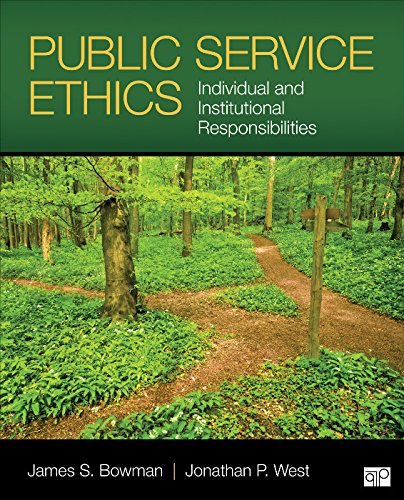List of Tables, Figures, and Exhibits
Preface
Acknowledgments
About the Authors
I. Foundations of Public Service Ethics
1. Pertinence, Practicality, and Poppycock
Pertinence: Reasons to Study Ethics
Practicality: Commitment as a Privilege and Obligation
Poppycock: Myths About Ethics
Conclusion
Appendix 1.1 Personal Checklist
2. Perspectives on Ethics: Macro, Meso, Micro
Levels of Analysis
Contemporary Research on Levels of Ethics
Meso Level of Analysis: The Organization
Micro Level of Analysis: The Individual
Factors Influencing Meso-Micro Ethics
Conclusion
Case Study 2.1 The Pennsylvania State University Athletic Sex Abuse Scandal
3. Values, Ethics, and Dilemmas
Defining Values
Applying Values in Public Service
Defining Ethics
Domains of Human Action: Law vs. Free Choice
Case Study 3.1 Challenge the Leader
Social Forces Endangering Ethics
Case Study 3.2 Value Conflicts in World Affairs
Conclusion
II. Individual-Centered Approaches to Ethics
4. Moral Development Theory
Kohlberg’s Moral Development Theory: A Rational Approach
Case Study 4.1 Applying Kohlberg’s Stages of Moral Development
Milgram’s Shock and Zimbardo’s Prison Experiments: Ethics Under Pressure
Haidt’s Social Intuitionalist Approach
Conclusion
5. Cognitive Ethics Methods: Result and Rule Problem-Solving Approaches
Approaches to Ethics
A Five-Stage Method for Analyzing Ethical Issues
Moral Courage
Case Study 5.1 Applying the Kew Gardens Principles
Applying the Five-stage Method: A Personal and Professional Conflict
Conclusion
Appendix 5.1 Sensitivity-Intensity Matrix Approach
Appendix 5.2 The Ethical Principles Approach
Case Study 5.2 Applying the Ethical Principles Approach: Playing Poker With a Vendor
Appendix 5.3 Line Drawing
Case Study 5.3 Applying the Line Drawing Method: A Questionable Gift
6. Virtue Theory
Comparing Cognitive and Virtue Ethics
The Vocabulary of Virtue
Habituation: The Formation of Character
Virtue Theory Strengths and Weaknesses
Case Study 6.1 Applying Rion’s Ethical Decision-Making Framework: Probing the Conscience
Utility of Virtue Ethics for Managers: Challenge and Response
Conclusion
7. Conscious Deliberation and Subconscious Action: The Dishonesty of Honest People
Results, Rule, Virtue: Decision Making With the Ethics Triad
Utilizing the Ethics Triad
Case Study 7.1 The Ethics Triad: Applying the Rational Approach to a Birthday Invitation
Behavioral Ethics: What People Do vs. What They Say They Do
Conclusion
Appendix 7.1 Critiquing Student Case Analyses
III. Institutional Approaches to Ethics
8. Organizational Ethics
Types of Organizational Strategies
Ethical Infrastructure: Building Blocks in Ethics Management
Case Study 8.1 Applying Philosophical and Behavioral Ethics Approaches: To Follow or Not to Follow Government Hiring Policy
Organizational Structure
Values Statements
Psychological Contracts
Oaths and Codes
Institutionalizing Ethics Cultural Competency
Conclusion
9. Corruption Control
Scope and Magnitude of Corruption Today
Defining Corruption
Causes of Corruption and Evolution of Anticorruption Strategies
Individual and Institutional Moral Failure
Scandals: Types and Impacts
Avenues for Reform
Case Study 9.1 Applying Philosophical and Behavioral Ethics Approaches: Public to Private Employment on Similar Work
Conclusion
10. Whistleblowing in Organizations
Significance of Whistleblowing
Case Study 10.1 Problem Solver or Trouble Maker?
Whistleblower Laws
Case Study 10.2 Applying Rational and Behavioral Ethics Approaches: Cooking the Books
Dissent in Organizations
Case Study 10.3 The Silent Whistle
Case Study 10.4 Successful Whistleblowing
Trends in Blowing the Whistle
Conclusion
IV. Issues in Public Service Ethics
11. Ethics and Elected Officials
Case Study 11.1 Congressional Conflict of Interest
Case Study 11.2 Congressional Insider Trading
Ethics and Legislative Decision Making
Case Study 11.3 Robert Torricelli and the CIA
The Influence of Character and Roles on Elected Officials
Polarization of Politics and Ethical Implications
Negative Campaigning
The Problem of Dirty Hands
Case Study 11.4 Applying Philosophical and Behavioral Ethics Approaches: Interrogation Methods
Presidents and Truthfulness
The Influence of Citizens and the Media on Politicians
Case Study 11.5 Applying Philosophical and Behavioral Ethics Approaches: A Transgender City Manager
Conclusion
Appendix 11.1 Ethics Committees
12. Organizational Gaming and Performance Measurement
Duplicity Pressures
Case Study 12.1 Organizational Cheating in Education
Types of Gaming
Cheating, Politicians, and Public Opinion
Ethically Evaluating and Minimizing Cheating
Case Study 12.2 Applying Philosophical and Behavioral Ethics Approaches: Electronic Surveillance in the Workplace
Conclusion
13. At-Will Employment
The Employment At-Will Doctrine
Applying the Ethics Triad to At-Will Employment
Summary and Conclusion
14. Open Government Case Study: Pay Disclosure
Trends and Tensions in Open Government
Background: Increasing Demand for Transparency
Applying the Ethics Triad to Pay Disclosure
Summary
Conclusion: Implementing Balance in Transparency Policy
V. Future History
15. Choices and Strategies for the Years Ahead
Moral Grandeur
Moral Decay
New Challenges
Guidelines for Ethical Conduct
Case Study 15.1 Applying Rational and Philosophical Ethics Approaches: Drones in Domestic Law Enforcement
Appendix 15.1 Sample Graduate Student Action Plan
Index
Public Service Ethics : Individual and Institutional Responsibilities by James S. Bowman. ISBN 9781483323763. Published by Sage/CQ Press in 2015. Publication and catalogue information, links to buy online and reader comments.
